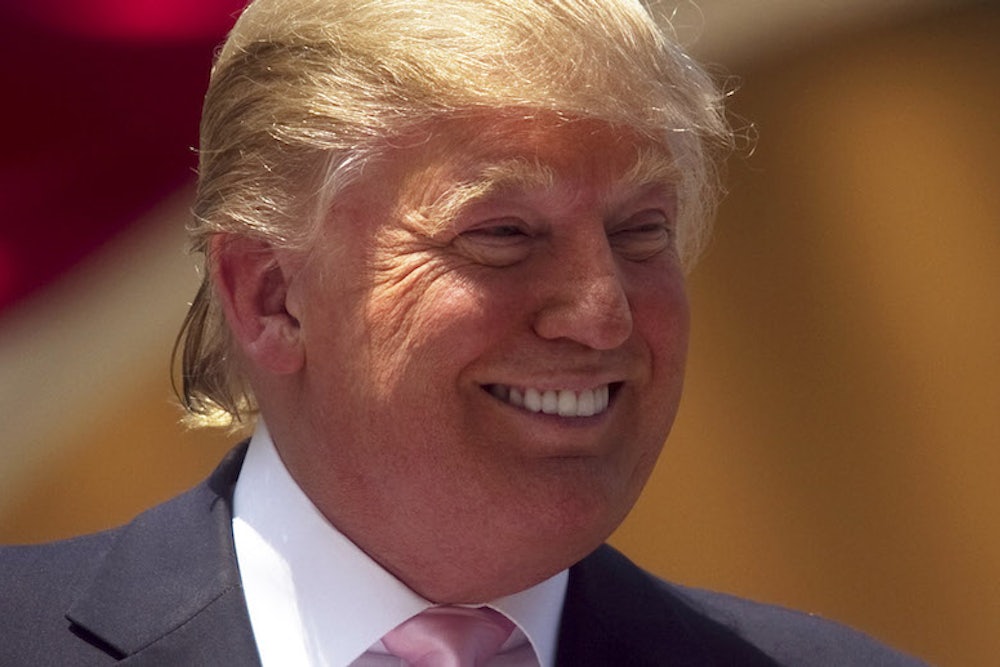The tenor of Republican Party rhetoric has darkened. Until recently, most Republican candidates and strategists regarded Donald Trump’s presidential campaign as something ephemeral—a flash in the pan; a storm to be waited out. Now they are openly contemplating the possibility that he could win, or at least ride his steady support all the way to the Republican nominating convention next summer, leaving havoc in his wake.
Consider:
- On Tuesday, Republican presidential candidate Lindsey Graham said, "If Donald Trump is the nominee, that’s the end of the Republican Party.”
- Also on Tuesday, Graham’s home state of South Carolina—the first southern state to hold a primary—announced that it would require candidates to sign a pledge promising to support the Republican presidential nominee in the general election, and not launch an independent candidacy. Trump has thus far refused to make such a promise.
- After a Monday focus group brought Trump’s appeal to the Republican grassroots into sharp relief, GOP pollster Frank Luntz had a mini anxiety attack. “You guys understand how significant this is?” Luntz asked reporters. “This is real. I’m having trouble processing it. Like, my legs are shaking.”
As much as Trump himself is an outgrowth of the reckless way conservatives have stoked the resentment of the Republican Party base, his durability is also an outgrowth of an electoral process conservatives have shaped aggressively. Even if Trump’s ceiling of support is around 30 percent, it’s enough to ride out the primary process—and retain the lead—in a fractured field where almost every candidate has a wealthy patron or two.
In a better-controlled environment, Trump would be a less potent force. As the frontrunner, though, he’s steering the policy debate in ways that have Republican donors and strategists deeply spooked. As Greg Sargent writes at the Washington Post, “his willingness to say what other Republicans won’t has forced out into the open genuine policy debates among Republicans that had previously been shrouded in vagueness or imprisoned within party orthodoxy.”
Right now, Trump has his hand on the third rail of Republican politics. He’s arguing that wealthy people shouldn’t get a pass on paying regular federal income taxes. “The middle class is getting clobbered in this country. You know the middle class built this country, not the hedge fund guys, but I know people in hedge funds that pay almost nothing, and it’s ridiculous, okay?”
For almost any candidate, promising to reduce taxes on rich people is the price of admission into the Republican primary. Trump, by contrast, is poised not only to survive this apostasy, but to singe any of the more orthodox rivals who challenge him.
Senator Marco Rubio’s tax plan represents the most pointed contrast to Trump’s middle-class populism. Rubio proposes not just to lower the top marginal income tax rate, but to completely zero out capital gains taxes. To escape scrutiny for offering such a huge sop to the wealthy, Rubio plans to fall back on his origin story—as the son of a bartender who worked at a hotel financed by investors, Rubio can elide the typical criticisms of trickle-down economics, by claiming to be a direct beneficiary of it. This might be an effective diversion against a Democratic politician promising to increase people’s taxes, but against a rapacious developer like Trump, it falls completely flat. Trump would love nothing more than for a career elected official like Rubio to lecture him about the impact tax rates have on investment and growth. Trump has managed to survive in the business world at a number of different capital gains tax rates, whereas Rubio has struggled to stay afloat, and racked up high levels of credit card debt, in the working world.
If Trump were running an insurgent candidacy against Rubio and one other viable Republican, a supply-side platform would fare pretty well. Republican base voters aren’t as doctrinaire about taxes as Republican elites are, but they still support cutting taxes by a significant margin. In a smaller field, Rubio might be the standard bearer. Instead, the standard bearer claims to want to raise taxes on the rich. And much to the dismay of just about everyone else in the Republican Party, he isn’t going anywhere.
